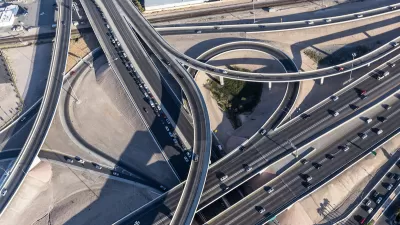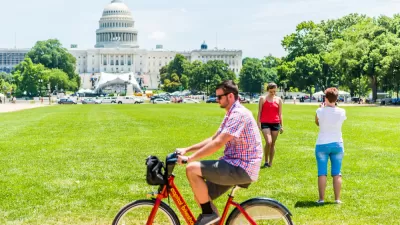Do you want your transportation dollars spent on the National Corvette Museum, turtle tunnels, giant roadside coffee pots, restoration of Battleship Texas? These are some of the "tall tales" being spun by Republicans about the transportation bill.
In September, Sen. Tom Coburn (R-OK) delayed an extension of the current transportation bill (that expired two years ago) in his effort to target transportation enhancements, a required component of transporation spending in the transportation authorization legislation. Now that a 'clean' extension was approved, the Senate Environment and Public Works committee is crafting the new bill and Coburn, while not a member, has resumed his efforts that have spread to his Republican colleagues. "He produced a list of 39 projects that he said exemplify extravagance at a time when states don't have enough money to repair structurally deficient bridges."
Never mind that many of the claims appear to be distorted. Because enhancements include twelve categories that include environmental mitigation, transportation museums, and historical preservation, some projects, on their face, make for easy targets when the nation's transportation infrastructure is in an alarming state of disrepair.
"They are trying to eliminate a requirement that states use a portion of their highway aid for 'transportation enhancements,' 12 categories of projects from bike and walking paths to scenic overlooks and landscaping."
Enhancement opponents falsely claim that 10% of (total) federal transportation aide go to enhancements - the correct percentage is 1.5%, though it is true that 10% of funding in the transportation reauthorization bill is required to be spent on them.
From Washington Post: Federal transportation funding mandates - the coming Capitol Hill battle: "The looming Capitol Hill battle over transportation priorities in a budget-slashing era may have found its lightning rod issue: bike paths, pedestrian walkways and wildflowers planted by the side of the road."
Thanks to Rachel Selig Nader
FULL STORY: Republican Leaders Spin Funding Tall Tales

Maui's Vacation Rental Debate Turns Ugly
Verbal attacks, misinformation campaigns and fistfights plague a high-stakes debate to convert thousands of vacation rentals into long-term housing.

Planetizen Federal Action Tracker
A weekly monitor of how Trump’s orders and actions are impacting planners and planning in America.

In Urban Planning, AI Prompting Could be the New Design Thinking
Creativity has long been key to great urban design. What if we see AI as our new creative partner?

San Francisco Mayor Backtracks on Homelessness Goal
Mayor Dan Lurie ran on a promise to build 1,500 additional shelter beds in the city, complete with supportive services. Now, his office says they are “shifting strategy” to focus on prevention and mental health treatment.

How Trump's HUD Budget Proposal Would Harm Homelessness Response
Experts say the change to the HUD budget would make it more difficult to identify people who are homeless and connect them with services, and to prevent homelessness.

The Vast Potential of the Right-of-Way
One writer argues that the space between two building faces is the most important element of the built environment.
Urban Design for Planners 1: Software Tools
This six-course series explores essential urban design concepts using open source software and equips planners with the tools they need to participate fully in the urban design process.
Planning for Universal Design
Learn the tools for implementing Universal Design in planning regulations.
Gallatin County Department of Planning & Community Development
Heyer Gruel & Associates PA
JM Goldson LLC
Mpact (founded as Rail~Volution)
City of Camden Redevelopment Agency
City of Astoria
Jefferson Parish Government
Camden Redevelopment Agency
City of Claremont




























